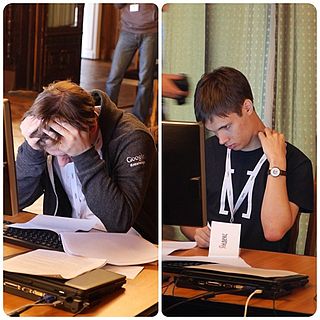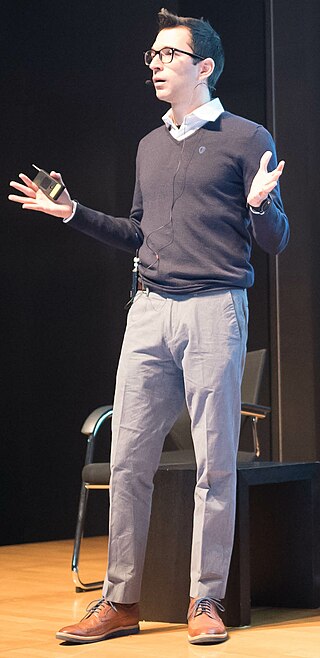
The Defense Advanced Research Projects Agency (DARPA) is a research and development agency of the United States Department of Defense responsible for the development of emerging technologies for use by the military. Originally known as the Advanced Research Projects Agency (ARPA), the agency was created on February 7, 1958, by President Dwight D. Eisenhower in response to the Soviet launching of Sputnik 1 in 1957. By collaborating with academia, industry, and government partners, DARPA formulates and executes research and development projects to expand the frontiers of technology and science, often beyond immediate U.S. military requirements. The name of the organization first changed from its founding name, ARPA, to DARPA, in March 1972, changing back to ARPA in February 1993, then reverted to DARPA in March 1996.

A paper shredder is a mechanical device used to cut sheets of paper into either strips or fine particles. Government organizations, businesses, and private individuals use shredders to destroy private, confidential, or otherwise sensitive documents.
The DARPA Grand Challenge is a prize competition for American autonomous vehicles, funded by the Defense Advanced Research Projects Agency, the most prominent research organization of the United States Department of Defense. Congress has authorized DARPA to award cash prizes to further DARPA's mission to sponsor revolutionary, high-payoff research that bridges the gap between fundamental discoveries and military use. The initial DARPA Grand Challenge in 2004 was created to spur the development of technologies needed to create the first fully autonomous ground vehicles capable of completing a substantial off-road course within a limited time. The third event, the DARPA Urban Challenge in 2007, extended the initial Challenge to autonomous operation in a mock urban environment. The 2012 DARPA Robotics Challenge, focused on autonomous emergency-maintenance robots, and new Challenges are still being conceived. The DARPA Subterranean Challenge was tasked with building robotic teams to autonomously map, navigate, and search subterranean environments. Such teams could be useful in exploring hazardous areas and in search and rescue.
Topcoder is a crowdsourcing company with an open global community of designers, developers, data scientists, and competitive programmers. Topcoder pays community members for their work on the projects and sells community services to corporate, mid-size, and small-business clients. Topcoder also organizes the annual Topcoder Open tournament and a series of smaller regional events.
The Portable Open Source Security Elements (POSSE) project was a co-operative venture between the University of Pennsylvania Distributed Systems Laboratory, the OpenBSD project and others. It received funding through a grant from the United States Defense Advanced Research Projects Agency (DARPA). The project's goal was to increase the security of some open source projects, including Apache and OpenSSL. The project ran from 2001 to April 2003, when the grant from DARPA was prematurely terminated.

Stanley is an autonomous car created by Stanford University's Stanford Racing Team in cooperation with the Volkswagen Electronics Research Laboratory (ERL). It won the 2005 DARPA Grand Challenge, earning the Stanford Racing Team a $2 million prize.

Crowdsourcing involves a large group of dispersed participants contributing or producing goods or services—including ideas, votes, micro-tasks, and finances—for payment or as volunteers. Contemporary crowdsourcing often involves digital platforms to attract and divide work between participants to achieve a cumulative result. Crowdsourcing is not limited to online activity, however, and there are various historical examples of crowdsourcing. The word crowdsourcing is a portmanteau of "crowd" and "outsourcing". In contrast to outsourcing, crowdsourcing usually involves less specific and more public groups of participants.
Fragapalooza is an annual video game festival/LAN party that takes place in Leduc, Alberta, Canada. The name Fragapalooza was derived from the Military Slang "Frag" and "palooza" which is the suffix for any type of named festival or gathering, such as Lollapalooza. Traditionally held in the summer, Fragapalooza runs over a period of four days. In 2008, it was Canada's largest LAN party event, having reached approximately 900 attendees at its peak.
There are a number of competitions and prizes to promote research in artificial intelligence.
The 2009 DARPA Network Challenge was a prize competition for exploring the roles the Internet and social networking play in the real-time communications, wide-area collaborations, and practical actions required to solve broad-scope, time-critical problems. The competition was sponsored by the Defense Advanced Research Projects Agency (DARPA), a research organization of the United States Department of Defense. The challenge was designed to help the military generate ideas for operating under a range of circumstances, such as natural disasters. Congress authorized DARPA to award cash prizes to further DARPA's mission to sponsor revolutionary, high-payoff research that bridges the gap between fundamental discoveries and their use for national security.

Otávio Good is a Brazilian and American computer programmer and inventor. He is the original author of Word Lens, the first augmented reality translation application that replaces printed text into the desired language in video without connection to the Internet.

Eterna is a browser-based "game with a purpose", developed by scientists at Carnegie Mellon University and Stanford University, that engages users to solve puzzles related to the folding of RNA molecules. The project is supported by the Bill and Melinda Gates Foundation, Stanford University, and the National Institutes of Health. Prior funders include the National Science Foundation.

Competitive programming or sport programming is a mind sport involving participants trying to program according to provided specifications. The contests are usually held over the Internet or a local network. Competitive programming is recognized and supported by several multinational software and Internet companies, such as Google, and Meta.
The MyHeartMap Challenge is a community improvement initiative and part of a research study being conducted at the University of Pennsylvania to map automated external defibrillators (AEDs) in the city of Philadelphia.
A scrap metal shredder, also sometimes referred to as a metal scrap shredder, is a machine used for reducing the size of scrap metal. Scrap metal shredders come in many different variations and sizes.

Exit is an American game show on Syfy that premiered on June 4, 2013.

Iyad Rahwan, is a Syrian-Australian scientist. He is the director of the Center for Humans and Machines at the Max Planck Institute for Human Development. Between 2015 and 2020, he was an associate professor of Media Arts & Sciences at the MIT Media Lab. Rahwan's work lies at the intersection of the computer and social sciences, where he has investigated topics in computational social science, collective intelligence, large-scale cooperation, and the social aspects of artificial intelligence.

Printer tracking dots, also known as printer steganography, DocuColor tracking dots, yellow dots, secret dots, or a machine identification code (MIC), is a digital watermark which many color laser printers and photocopiers produce on every printed page that identifies the specific device that was used to print the document. Developed by Xerox and Canon in the mid-1980s, the existence of these tracking codes became public only in 2004.
Over the years, the U.S. Defense Advanced Research Projects Agency (DARPA) has conducted a number of prize competitions to spur innovations. A prize competition allows DARPA to establish an ambitious goal, which makes public way for novel approaches from the public that might otherwise appear too risky to undertake by experts in a particular discipline.










